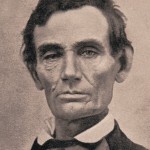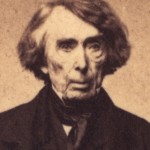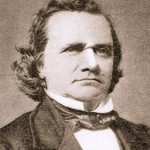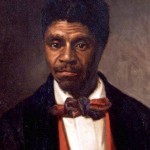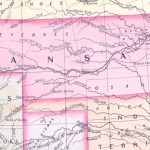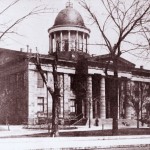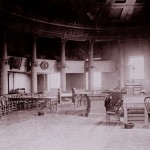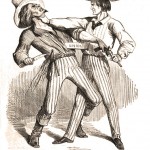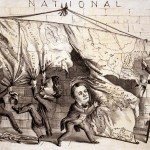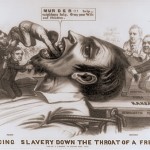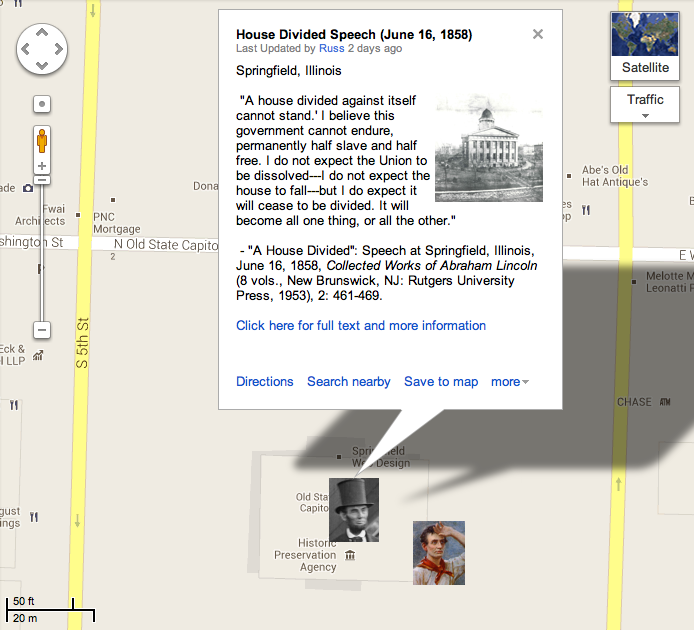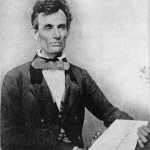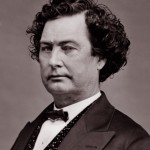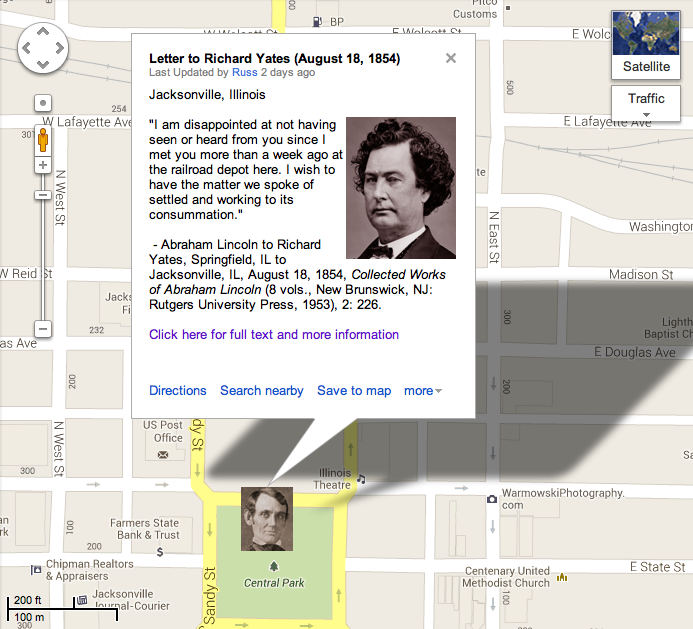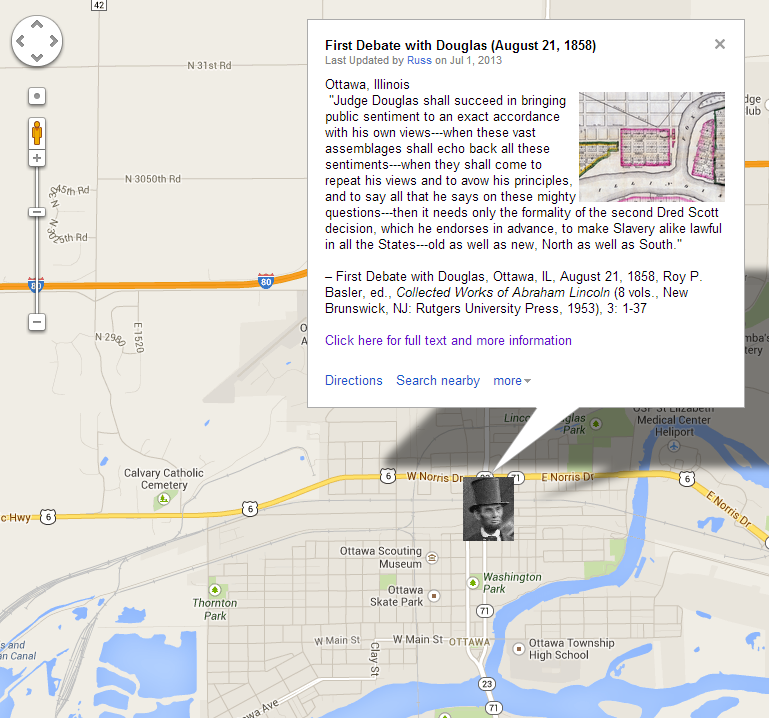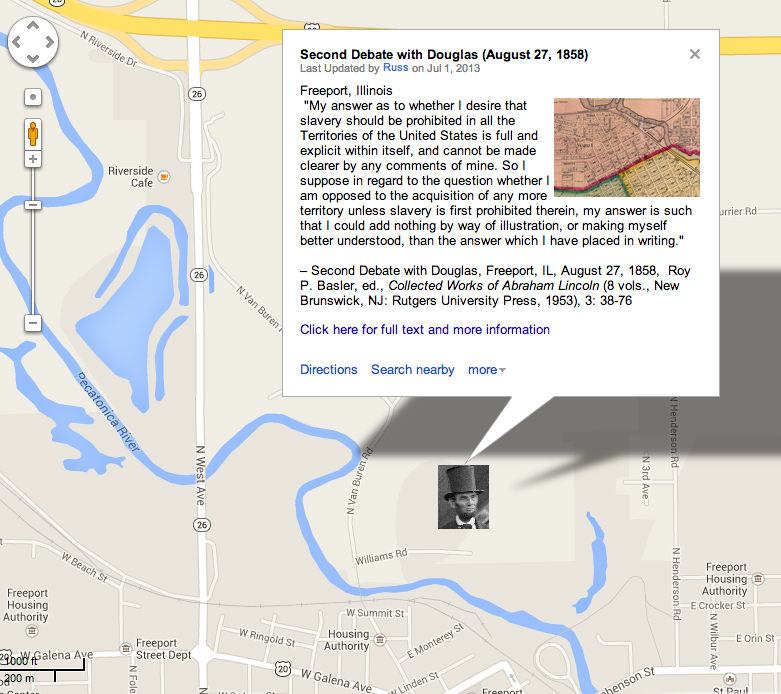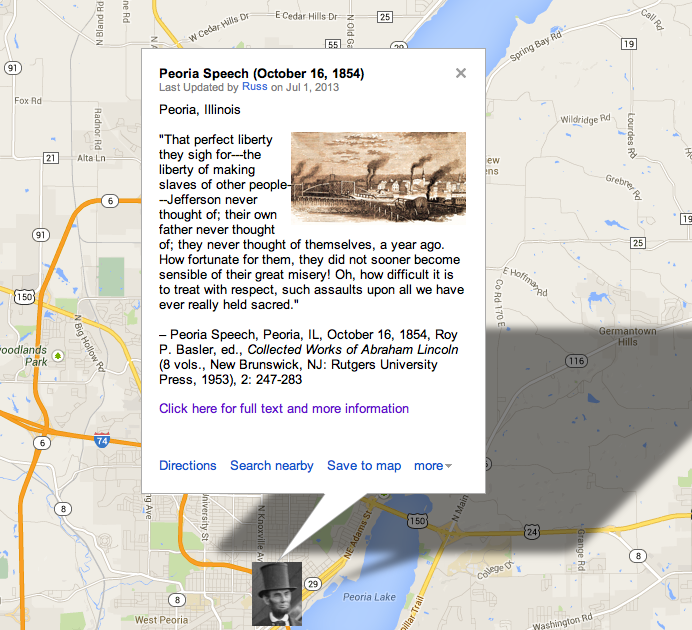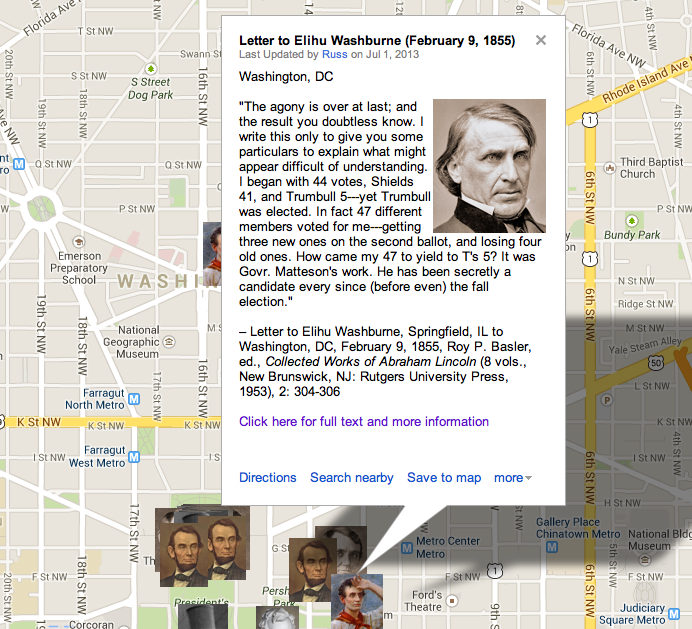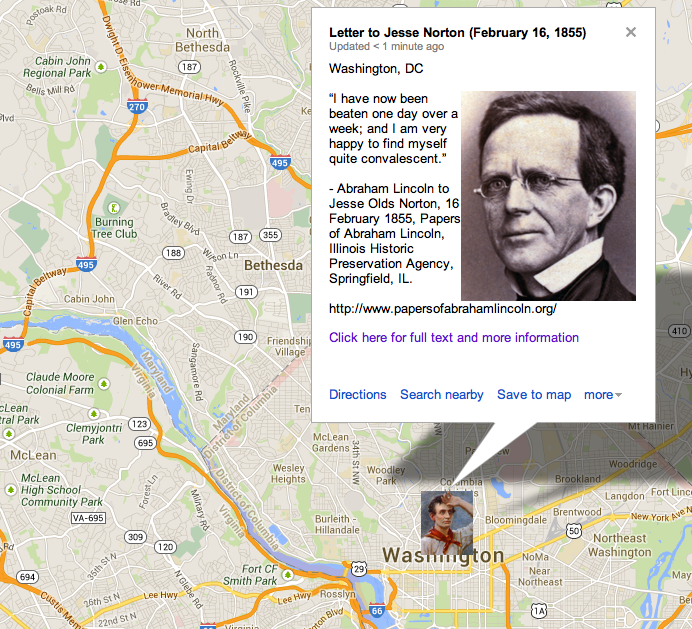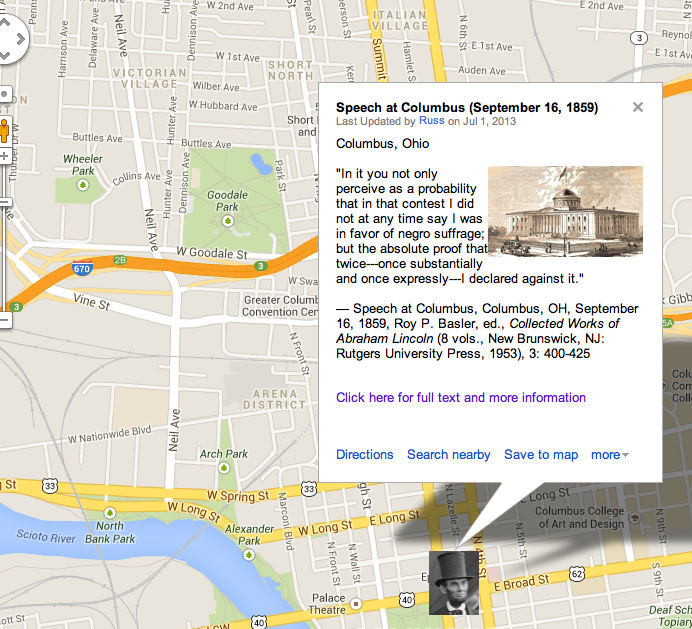Contributing editors for this page include Lisa Staup
Ranking
#48 on the list of 150 Most Teachable Lincoln Documents
Annotated Transcript
“Abraham Lincoln was born Feb. 12, 1809, then in Hardin, now in the more recently formed county of Larue, Kentucky.”
Audio Version
On This Date
[Editorial Note: This undated sketch has traditionally been identified as a document created sometime in early June 1860]
HD Daily Report, June 1, 1860
The Lincoln Log, June 2, 1860
Close Readings
Lisa Staup, blog post for “Understanding Lincoln” (via Wix), 2016
Custom Map
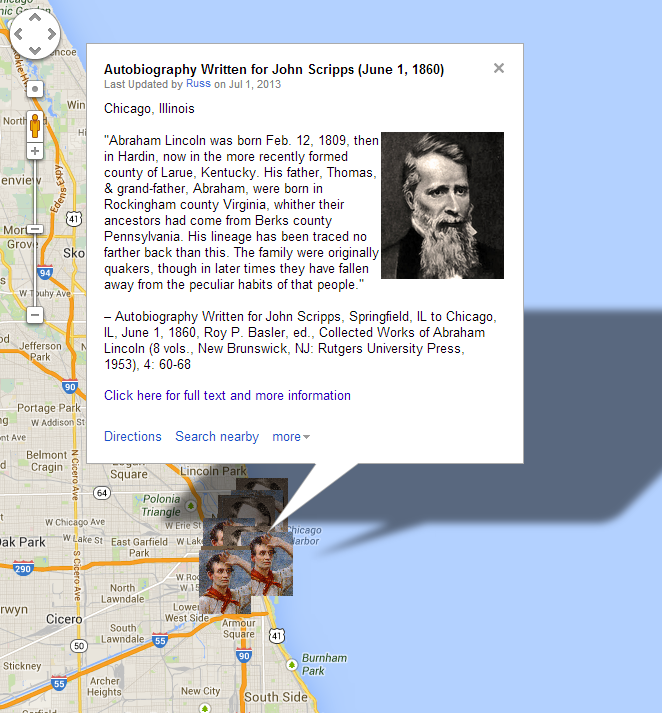
View in larger map
How Historians Interpret
“John Locke Scripps, a senior editor of the Chicago Press and Tribune, managed to convince Lincoln to write an autobiographical account that would serve as the basis for a campaign biography. This essay of just over three thousand words would prove to be Lincoln’s longest work of autobiography. His description of his early education is typical of the essay’s unusual third-person style: ‘A. now thinks that the aggregate of all his schooling did not amount to one year. He was never in a college or Academy as a student; and never inside of a college or academy building till since he had a law-license. What he has in the way of education, he has picked up.’ Lincoln began his autobiography referring to himself as ‘A’ and progressed to ‘Mr. L.’ Remarkably brief about certain periods of his life, the essay stops in 1856 and does not include the 1858 debates with Stephen A. Douglas that first brought him to national attention. Lincoln’s sparse account tells us as much as he wanted the public to know. Scripps would recall the difficulty he encountered ‘to induce [Lincoln] to communicate the homely facts and incidents of his early life.’ Plainly uncomfortable talking about his childhood in Kentucky and Indiana, Lincoln told Scripps, ‘It is a great piece of folly to attempt to make anything out of my early life.’”
—Ronald C. White, A Lincoln: A Biography, (New York: Random House Publishing Group, 2009), 7-8.
“Lincoln was ashamed not only of his family background but also of the poverty in which he grew up. When John Locke Scripps interviewed him in 1860, Lincoln expressed reluctance ‘to communicate the homely facts and incidents of his early life. He seemed to be painfully impressed with the extreme poverty of his early surroundings—the utter absence of all romantic and heroic elements,’ and even questioned the proposal to have a biography written. ‘Why Scripps,’ said Lincoln, ‘it is a great piece of folly to attempt to make anything out of my early life. It can all be condensed into a single sentence and that sentence you will find in Gray’s Elegy; ‘The short and simple annals of the poor.’ That’s my life, and that’s all you or anyone else can make of it.’”
—Michael Burlingame, Abraham Lincoln: A Life, (Baltimore: Johns Hopkins University Press, 2013), 15-16.
NOTE TO READERS
This page is under construction and will be developed further by students in the new “Understanding Lincoln” online course sponsored by the House Divided Project at Dickinson College and the Gilder Lehrman Institute of American History. To find out more about the course and to see some of our videotaped class sessions, including virtual field trips to Ford’s Theatre and Gettysburg, please visit our Livestream page at http://new.livestream.com/gilderlehrman/lincoln
Searchable Text
Abraham Lincoln was born Feb. 12, 1809, then in Hardin, now in the more recently formed county of Larue, Kentucky. His father, Thomas, & grand-father, Abraham, were born in Rockingham county Virginia, whither their ancestors had come from Berks county Pennsylvania. His lineage has been traced no farther back than this. The family were originally quakers, though in later times they have fallen away from the peculiar habits of that
people. The grand-father Abraham, had four brothers—Isaac, Jacob, John & Thomas. So far as known, the descendants of Jacob and John are still in Virginia. Isaac went to a place near where Virginia, North Carolina, and Tennessee, join; and his decendants are in that region. Thomas came to Kentucky, and after many years, died there, whence his decendants went to Missouri. Abraham, grandfather of the subject of this sketch, came to Kentucky, and was killed by indians about the year 1784. He left a widow, three sons and two daughters. The eldest son, Mordecai, remained in Kentucky till late in life, when he removed to Hancock county, Illinois, where soon after he died, and where several of his descendants still reside. The second son, Josiah, removed at an early day to a place on Blue River, now within Harrison [Hancock] county, Indiana; but no recent information of him, or his family, has been obtained. The eldest sister, Mary, married Ralph Crume and some of her descendants are now known to be in Breckenridge county Kentucky. The second sister, Nancy, married William Brumfield, and her family are not known to have left Kentucky, but there is no recent information from them. Thomas, the youngest son, and father of the present subject, by the early death of his father, and very narrow circumstances of his mother, even in childhood was a wandering laboring boy, and grew up litterally without education. He never did more in the way of writing than to bunglingly sign his own name. Before he was grown, he passed one year as a hired hand with his uncle Isaac on Wata[u]ga, a branch of the Holsteen [Holston] River. Getting back into Kentucky, and having reached his 28th. year, he married Nancy Hanks—mother of the present subject—in the year 1806. She also was born in Virginia; and relatives of hers of the name of Hanks, and of other names, now reside in Coles, in Macon, and in Adams counties, Illinois, and also in Iowa. The present subject has no brother or sister of the whole or half blood. He had a sister, older than himself, who was grown and married, but died many years ago, leaving no child. Also a brother, younger than himself, who died in infancy. Before leaving Kentucky he and his sister were sent for short periods, to A.B.C. schools, the first kept by Zachariah Riney, and the second by Caleb Hazel.
At this time his father resided on Knob-creek, on the road from Bardstown Ky. to Nashville Tenn. at a point three, or three and a half miles South or South-West of Atherton’s ferry on the Rolling Fork. From this place he removed to what is now Spencer county Indiana, in the autumn of 1816, A. then being in his eigth year. This removal was partly on account of slavery; but chiefly on account of the difficulty in land titles in Ky. He settled in an unbroken forest; and the clearing away of surplus wood was the great task a head. A. though very young, was large of his age, and had an axe put into his hands at once; and from that till within his twentythird year, he was almost constantly handling that most useful instrument—less, of course, in plowing and harvesting seasons. At this place A. took an early start as a hunter, which was never much improved afterwards. (A few days before the completion of his eigth year, in the absence of his father, a flock of wild turkeys approached the new log-cabin, and A. with a rifle gun, standing inside, shot through a crack, and killed one of them. He has never since pulled a trigger on any larger game.) In the autumn of 1818 his mother died; and a year afterwards his father married Mrs. Sally Johnston, at Elizabeth-Town, Ky—a widow, with three children of her first marriage. She proved a good and kind mother to A. and is still living in Coles Co. Illinois. There were no children of this second marriage. His father’s residence continued at the same place in Indiana, till 1830. While here A. went to A.B.C. schools by littles, kept successively by Andrew Crawford, — Sweeney, and Azel W. Dorsey. He does not remember any other. The family of Mr. Dorsey now reside in Schuyler Co. Illinois. A. now thinks that the agregate of all his schooling did not amount to one year. He was never in a college or Academy as a student; and never inside of a college or accademy building till since he had a law-license. What he has in the way of education, he has picked up. After he was twentythree, and had separated from his father, he studied English grammar, imperfectly of course, but so as to speak and write as well as he now does. He studied and nearly mastered the Six-books of Euclid, since he was a member of Congress. He regrets his want of education, and does what he can to supply the want. In his tenth year he was kicked by a horse, and apparently killed for a time. When he was nineteen, still residing in Indiana, he made his first trip upon a flat-boat to New-Orleans. He was a hired hand merely; and he and a son of the owner, without other assistance, made the trip. The nature of part of the cargo-load, as it was called—made it necessary for them to linger and trade along the Sugar coast—and one night they were attacked by seven negroes with intent to kill and rob them. They were hurt some in the melee, but succeeded in driving the negroes from the boat, and then “cut cable” “weighed anchor” and left.
March 1st. 1830—A. having just completed his 21st. year, his father and family, with the families of the two daughters and sons-in-law, of his step-mother, left the old homestead in Indiana, and came to Illinois. Their mode of conveyance was waggons drawn by ox-teams, or A. drove one of the teams. They reached the county of Macon, and stopped there some time within the same month of March. His father and family settled a new place on the North side of the Sangamon river, at the junction of the timber-land and prairie, about ten miles Westerly from Decatur. Here they built a log-cabin, into which they removed, and made sufficient of rails to fence ten acres of ground, fenced and broke the ground, and raised a crop of sow[n] corn upon it the same year. These are, or are supposed to be, the rails about which so much is being said just now, though they are far from being the first, or only rails ever made by A.
The sons-in-law, were temporarily settled at other places in the county. In the autumn all hands were greatly afflicted with augue and fever, to which they had not been used, and by which they were greatly discouraged—so much so that they determined on leaving the county. They remained however, through the succeeding winter, which was the winter of the very celebrated “deep snow” of Illinois. During that winter, A. together with his step-mother’s son, John D. Johnston, and John Hanks, yet residing in Macon county, hired themselves to one Denton Offutt, to take a flat boat from Beardstown Illinois to New-Orleans; and for that purpose, were to join him—Offut—at Springfield, Ills so soon as the snow should go off. When it did go off which was about the 1st. of March 1831—the county was so flooded, as to make traveling by land impracticable; to obviate which difficulty the[y] purchased a large canoe and came down the Sangamon river in it. This is the time and the manner of A’s first entrance into Sangamon County. They found Offutt at Springfield, but learned from him that he had failed in getting a boat at Beardstown. This lead to their hiring themselves to him at $12 per month, each; and getting the timber out of the trees and building a boat at old Sangamon Town on the Sangamon river, seven miles N.W. of Springfield, which boat they took to New-Orleans, substantially upon the old contract. It [6] was in connection with this boat that occurred the ludicrous incident of sewing up the hogs eyes. Offutt bought thirty odd large fat live hogs, but found difficulty in driving them from where [he] purchased them to the boat, and thereupon conceived the whim that he could sew up their eyes and drive them where he pleased. No sooner thought of than decided, he put his hands, including A. at the job, which they completed—all but the driving. In their blind condition they could not be driven out of the lot or field they were in. This expedient failing, they were tied and hauled on carts to the boat. It was near the Sangamon River, within what is now Menard county.
During this boat enterprize acquaintance with Offutt, who was previously an entire stranger, he conceved a liking for A. and believing he could turn him to account, he contracted with him to act as clerk for him, on his return from New-Orleans, in charge of a store and Mill at New-Salem, then in Sangamon, now in Menard county. Hanks had not gone to New-Orleans, but having a family, and being likely to be detained from home longer than at first expected, had turned back from St. Louis. He is the same John Hanks who now engineers the “rail enterprize” at Decatur; and is a first cousin to A’s mother. A’s father, with his own family & others mentioned, had, in pursuance of their intention, removed from Macon to Coles county. John D. Johnston, the step-mother’s son, went to them; and A. stopped indefinitely, and, for the first time, as it were, by himself at New-Salem, before mentioned. This was in July 1831. Here he rapidly made acquaintances and friends. In less than a year Offutt’s business was failing—had almost failed,—when the Black-Hawk war of 1832—broke out. A joined a volunteer company, and to his own surprize, was elected captain of it. He says he has not since had any success in life which gave him so much satisfaction. He went the campaign, served near three months, met the ordinary hardships of such an expedition, but was in no battle. He now owns in Iowa, the land upon which his own warrants for this service, were located. Returning from the campaign, and encouraged by his great popularity among his immediate neighbors, he, the same year, ran for the Legislature and was beaten—his own precinct, however, casting its votes 277 for and 7, against him. And this too while he was an avowed Clay man, and the precinct the autumn afterwards, giving a majority of 115 to Genl. Jackson over Mr. Clay. This was the only time A was ever beaten on a direct vote of the people. He was now without means and out of business, but was anxious to remain with his friends who had treated him with so much generosity, especially as he had nothing elsewhere to go to. He studied what he should do—thought of learning the black-smith trade—thought of trying to study law—rather thought he could not succeed at that without a better education. Before long, strangely enough, a man offered to sell and did sell, to A. and another as poor as himself, an old stock of goods, upon credit. They opened as merchants; and he says that was thestore. Of course they did nothing but get deeper and deeper in debt. He was appointed Post-master at New-Salem—the office being too insignificant, to make his politics an objection. The store winked out. The Surveyor of Sangamon, offered to depute to A that portion of his work which was within his part of the county. He accepted, procured a compass and chain, studied Flint, and Gibson a little, and went at it. This procured bread, and kept soul and body together. The election of 1834 came, and he was then elected to the Legislature by the highest vote cast for any candidate. Major John T. Stuart, then in full practice of the law, was also elected. During the canvass, in a private conversation he encouraged A. [to] study law. After the election he borrowed books of Stuart, took them home with him, and went at it in good earnest. He studied with nobody. He still mixed in the surveying to pay board and clothing bills. When the Legislature met, the law books were dropped, but were taken up again at the end of the session. He was re-elected in 1836, 1838, and 1840. In the autumn of 1836 he obtained a law licence, and on April 15, 1837 removed to Springfield, and commenced the practice, his old friend, Stuart taking him into partnership. March 3rd. 1837, by a protest entered upon the Ills. House Journal of that date, at pages 817, 818, A. with Dan Stone, another representative of Sangamon, briefly defined his position on the slavery question; and so far as it goes, it was then the same that it is now. The protest is as follows—(Here insert it) In 1838, & 1840 Mr. L’s party in the Legislature voted for him as Speaker; but being in the minority, he was not elected. After 1840 he declined a re-election to the Legislature. He was on the Harrison electoral ticket in 1840, and on that of Clay in 1844, and spent much time and labor in both those canvasses. In Nov. 1842 he was married to Mary, daughter of Robert S. Todd, of Lexington, Kentucky. They have three living children, all sons—one born in 1843, one in 1850, and one in 1853. They lost one, who was born in 1846. In 1846, he was elected to the lower House of Congress, and served one term only, commencing in Dec. 1847 and ending with the inaugeration of Gen. Taylor, in March 1849. All the battles of the Mexican war had been fought before Mr. L. took his seat in congress, but the American army was still in Mexico, and the treaty of peace was not fully and formally ratified till the June afterwards. Much has been said of his course in Congress in regard to this war. A careful examination of the Journals and Congressional Globe shows, that he voted for all the supply measures which came up, and for all the measures in any way favorable to the officers, soldiers, and their families, who conducted the war through; with this exception that some of these measures passed without years and nays, leaving no record as to how particular men voted. The Journals and Globe also show him voting that the war was unnecessarily and unconstitutionally begun by the President of the United States. This is the language of Mr. Ashmun’s amendment, for which Mr. L. and nearly or quite all, other whigs of the H. R. voted.
Mr. L’s reasons for the opinion expressed by this vote were briefly that the President had sent Genl. Taylor into an inhabited part of the country belonging to Mexico, and not to the U.S. and thereby had provoked the first act of hostility—in fact the commencement of the war; that the place, being the country bordering on the East bank of the Rio Grande, was inhabited by native Mexicans, born there under the Mexican government; and had never submitted to, nor been conquered by Texas, or the U.S. nor transferred to either by treaty—that although Texas claimed the Rio Grande as her boundary, Mexico had never recognized it, the people on the ground had never recognized it, and neither Texas nor the U.S. had ever enforced it—that there was a broad desert between that, and the country over which Texas had actual control—that the country where hostilities commenced, having once belonged to Mexico, must remain so, until it was somehow legally transferred, which had never been done.
Mr. L. thought the act of sending an armed force among the Mexicans, was unnecessary, inasmuch as Mexico was in no way molesting, or menacing the U.S. or the people thereof; and that it was unconstitutional, because the power of levying war is vested in Congress, and not in the President. He thought the principal motive for the act, was to divert public attention from the surrender of “Fifty-four, forty, or fight” to Great Brittain, on the Oregon boundary question.
Mr. L. was not a candidate for re-election. This was determined upon, and delcared before he went to Washington, in accordance with an understanding among whig friends, by which Col. Hardin, and Col. Baker had each previously served a single term in the same District.
In 1848, during his term in congress, he advocated Gen. Taylor’s nomination for the Presidency, in opposition to all others, and also took an active part for his election, after his nomination—speaking a few times in Maryland, near Washington, several times in Massachusetts, and canvassing quite fully his own district in Illinois, which was followed by a majority in the district of over 1500 for Gen. Taylor.
Upon his return from Congress he went to the practice of the law with greater earnestness than ever before. In 1852 he was upon the Scott electroal ticket, and did something in the way of canvassing, but owning to the hopelessness of the cause in Illinois, he did less than in previous presidential canvasses.
In 1854, his profession had almost superseded the thought of politics in his mind, when the repeal of the Missouri compromise aroused him as he had never been before.
In the autumn of that year he took the stump with no broader practical aim or object that [than?] to secure, if possible, the re-election of Hon Richard Yates to congress. His speeches at once attracted a more marked attention than they had ever before done. As the canvass proceeded, he was drawn to different parts of the state, outside of Mr. Yates’ district. He did not abandon the law, but gave his attention, by turns, to that and politics. The State agricultural fair was at Springfield that year, and Douglas was announced to speak there.
In the canvass of 1856, Mr. L. made over fifty speeches, no one of which, so far as he remembers, was put in print. One of them was made at Galena, but Mr. L. has no recollection of any part of it being printed; nor does he remember whether in that speech he said anything about a Supreme court decision. He may have spoken upon that subject; and some of the newspapers may have reported him as saying what is now ascribed to him; but he thinks he could not have expressed himself as represented.

